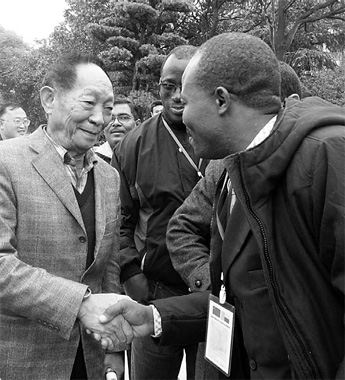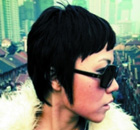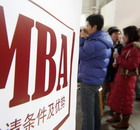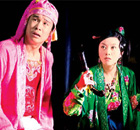Foreign and Military Affairs
Firm farming rice technique to world
By Lin Shujuan (China Daily)
Updated: 2009-12-16 07:45
 |
Large Medium Small |
The world's attention is on Copenhagen. For Rabesoa Maximin, an agricultural official from Madagascar, this is only half right.
 Yuan Longping, the revered 80-year-old "Father of China's Hybrid Rice", meets trainees from developing countries at the Yuan Longping High-Tech Agriculture training center in Changsha, capital of Central China's Hunan province, on Thursday. [Lin Shujuan] |
For Maximin, who is taking a three-week training course on China's hybrid-rice cultivating technique in Changsha, capital of Central China's Hunan province, climate change may be an urgent challenge but the global food crisis has been more devastating to a developing country like his.
Since 2008, a growing shortage and the rising price of food have put many developing countries, especially those in Africa, in dire need of more grain.
Once a rice exporter, Madagascar transformed into a rice importer in 2008 due to its expanding population, shifting climate and the country's still primitive rice-cultivation technique.
Hybrid rice, a technique invented by Chinese academician Yuan Longping and the application of which has helped Chinese farmers harvest 300 million tons more in aggregate output during the past two decades, has become the most sought-after technique for agro-technicians and government officials from developing countries. Maximin is one of the best examples.
"Madagascar has a perfect environment for rice cultivation," said Maximin on the sideline of his training courses, attended by 43 other agricultural officials from 27 developing countries. "If we adopt a hybrid rice technique nationwide, we expect to see our rice production double in two years and become a rice exporter soon."
At present, the average rice yield in Madagascar is 2.3 tons per hectare in comparison with China's average yield of 7.2 tons per hectare for hybrid rice and 5.6 tons per hectare for inbred rice.
"I can't wait to go back home to spread the technique as rice has become a grain crop of strategic importance to our national economy," said an excited Maximin, whose training course comes to an end today.
The training course Maximin attended was offered by the Yuan Longping High-Tech Agriculture, a State-owned company named after "the Father of China's Hybrid Rice".
It is one of more than 30 training courses the company has been offering since its establishment in June 1999.
The company aims to train 5,000 foreigners, establish 10 breeding centers and expand overseas cultivation bases to 10,000 hectares in 10 years so that countries receiving China's technical assistance in hybrid rice could breed new crop varieties and reap harvest on their home turf, said Wang Xiusong, director of the company's international exchange center.
"Without skilled technicians and well-informed government officials, hybrid-rice breeding and cultivation techniques could not be spread far across the world, let alone ease global grain crops shortage," said Wang.
By September when it was designated as China's first training base for the spread of hybrid rice breeding and cultivation technique by the Ministry of Commerce, the company has trained more than 2,000 government officials and agro-technicians from 50 countries through more than 30 training courses, Wang said.
The training course Maximin attended is the sixth offered by the company this year, Wang said.
"If the acres under hybrid rice reach half of the total rice planting area, the world's total rice output could increase by 150 million tons a year, enough to feed 400 million more people," said Yuan, the revered 80-year-old Chinese agricultural scientist to the boisterous applause of Maximin and other trainees on Friday during his keynote speech in English.







